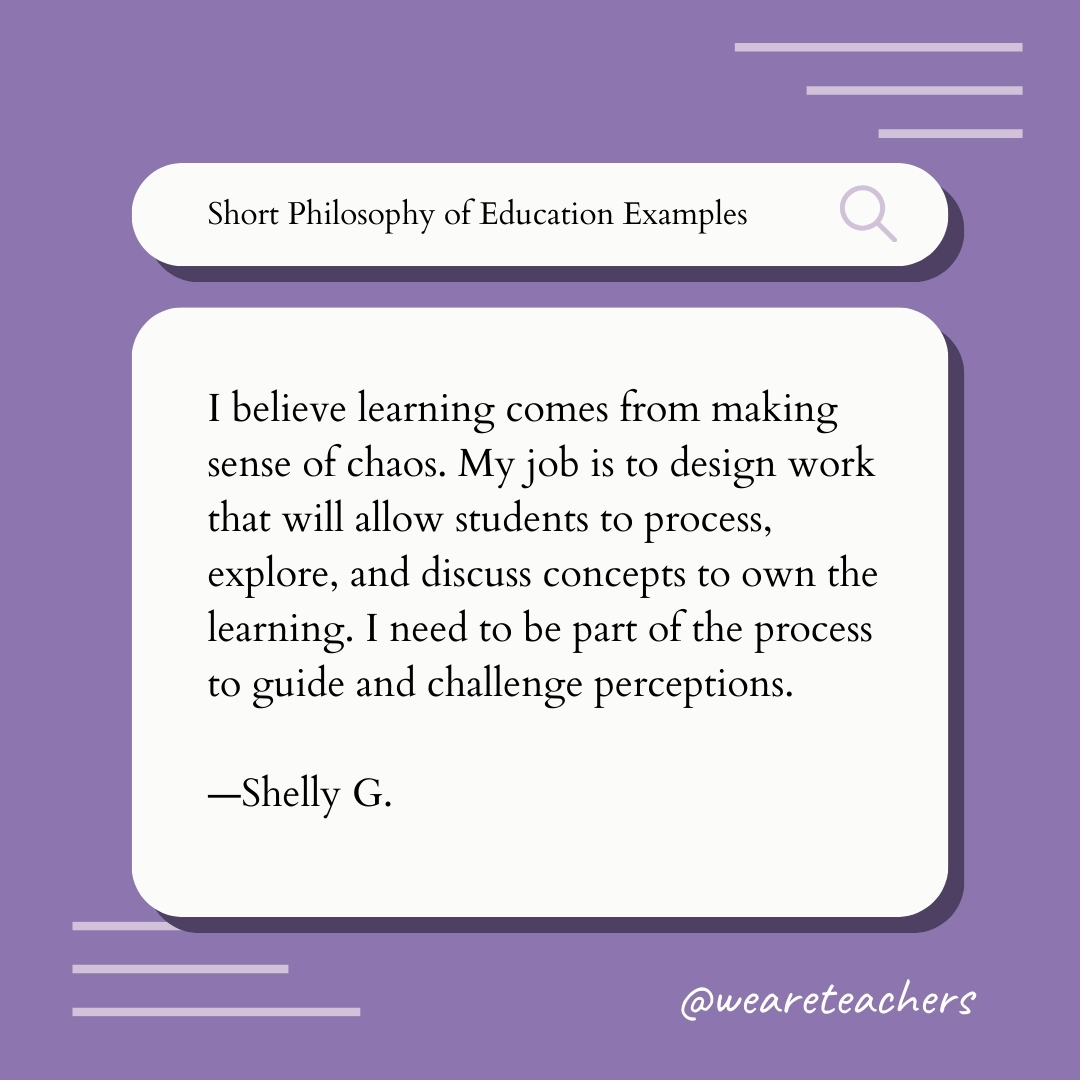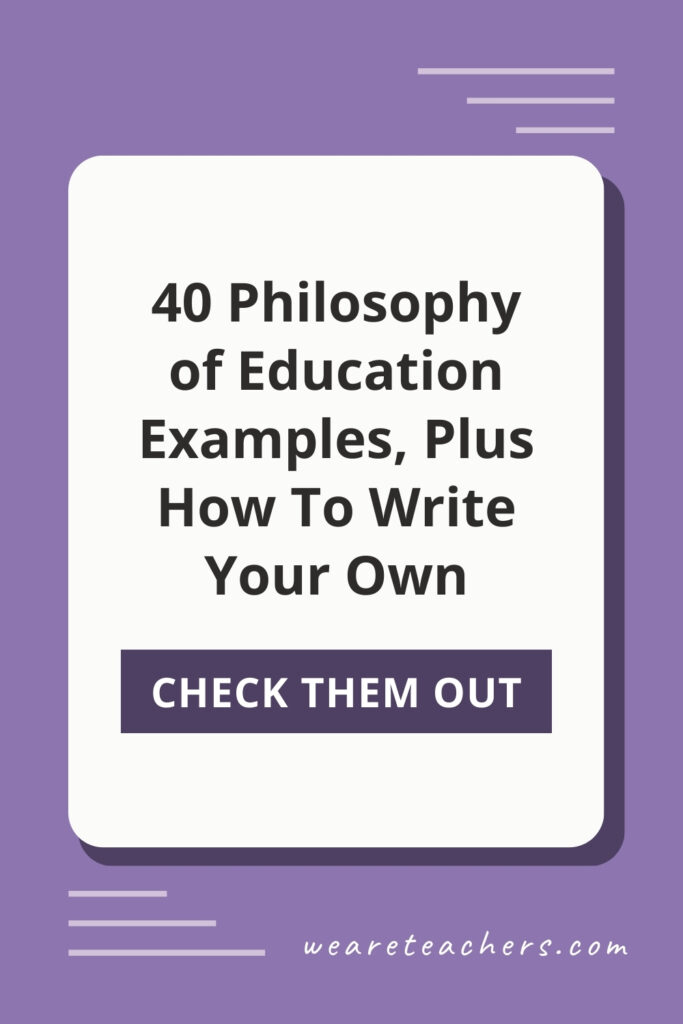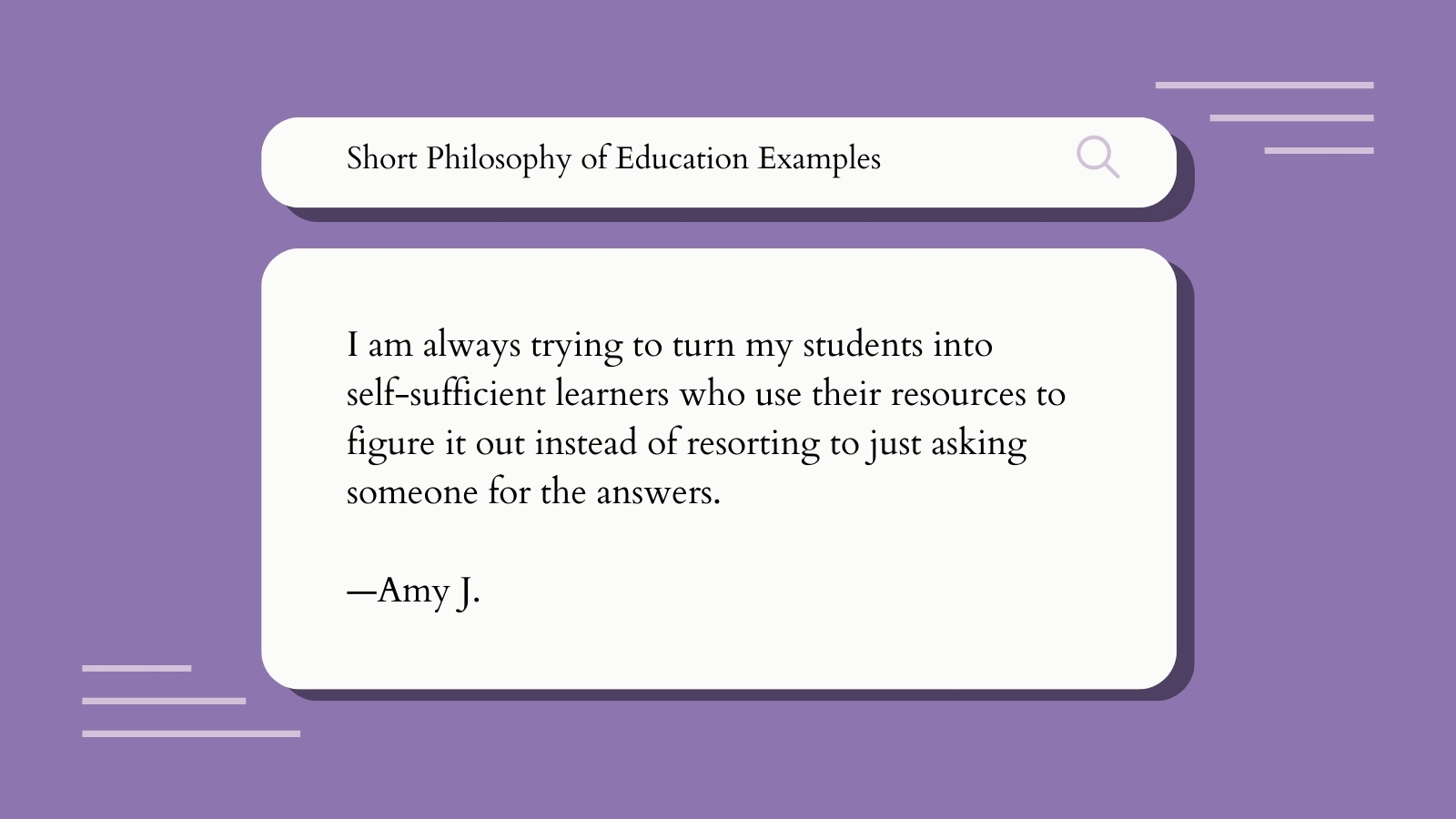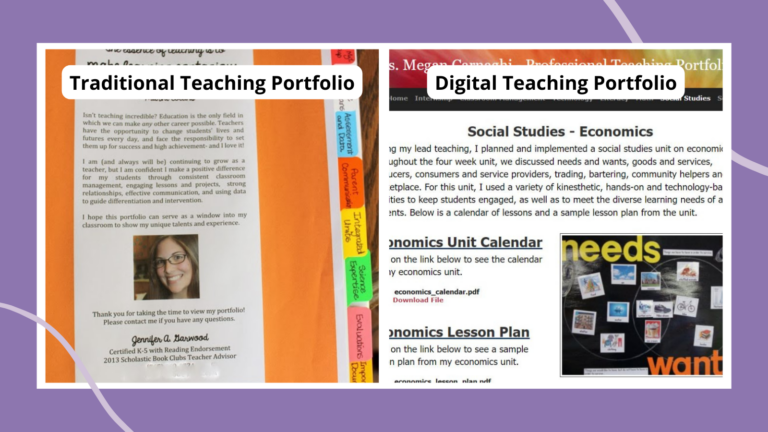These days, it’s become common for educators to be asked what their personal teaching philosophy is. Whether it’s for a job interview, a college class, or to share with your principal, crafting a philosophy of education can seem like a daunting task. So set aside some time to consider your own teaching philosophy (we’ll walk you through it), and be sure to look at philosophy of education examples from others (we’ve got those too!).
What is a philosophy of education?
Before we dive into the examples, it’s important to understand the purpose of a philosophy of education. This statement will provide an explanation of your teaching values and beliefs. Your teaching philosophy is ultimately a combination of the methods you studied in college and any professional experiences you’ve learned from since. It incorporates your own experiences (negative or positive) in education.
Many teachers have two versions of their teaching philosophy: a long form (a page or so of text) and a short form. The longer form is useful for job application cover letters or to include as part of your teacher portfolio. The short form distills the longer philosophy into a couple of succinct sentences that you can use to answer teacher job interview questions or even share with parents.
What’s the best teaching philosophy?
Here’s one key thing to remember: There’s no one right answer to “What’s your teaching philosophy?” Every teacher’s will be a little bit different, depending on their own teaching style, experiences, and expectations. And many teachers find that their philosophies change over time, as they learn and grow in their careers.
When someone asks for your philosophy of education, what they really want to know is that you’ve given thought to how you prepare lessons and interact with students in and out of the classroom. They’re interested in finding out what you expect from your students and from yourself, and how you’ll apply those expectations. And they want to hear examples of how you put your teaching philosophy into action.
What’s included in strong teaching philosophy examples?
Depending on who you ask, a philosophy of education statement can include a variety of values, beliefs, and information. As you build your own teaching philosophy statement, consider these aspects, and write down your answers to the questions.
Purpose of Education (Core Beliefs)
What do you believe is the purpose of teaching and learning? Why does education matter to today’s children? How will time spent in your classroom help prepare them for the future?
Use your answers to draft the opening statement of your philosophy of education, like these:
- Education isn’t just about what students learn, but about learning how to learn.
- A good education prepares students to be productive and empathetic members of society.
- Teachers help students embrace new information and new ways of seeing the world around them.
- A strong education with a focus on fundamentals ensures students can take on any challenges that come their way.
- I believe education is key to empowering today’s youth, so they’ll feel confident in their future careers, relationships, and duties as members of their community.
- Well-educated students are open-minded, welcoming the opinions of others and knowing how to evaluate information critically and carefully.
Teaching Style and Practices
Do you believe in student-led learning, or do you like to use the Socratic method instead? Is your classroom a place for quiet concentration or sociable collaboration? Do you focus on play-based learning, hands-on practice, debate and discussion, problem-solving, or project-based learning? All teachers use a mix of teaching practices and styles, of course, but there are some you’re likely more comfortable with than others. Possible examples:
- I frequently use project-based learning in my classrooms because I believe it helps make learning more relevant to my students. When students work together to address real-world problems, they use their [subject] knowledge and skills and develop communication and critical thinking abilities too.
- Play-based learning is a big part of my teaching philosophy. Kids who learn through play have more authentic experiences, exploring and discovering the world naturally in ways that make the process more engaging and likely to make a lasting impact.
- In my classroom, technology is key. I believe in teaching students how to use today’s technology in responsible ways, embracing new possibilities and using technology as a tool, not a crutch.
- While I believe in trying new teaching methods, I also find that traditional learning activities can still be effective. My teaching is mainly a mix of lecture, Socratic seminar, and small-group discussions.
- I’m a big believer in formative assessment, taking every opportunity to measure my students’ understanding and progress. I use tools like exit tickets and Kahoot! quizzes, and watch my students closely to see if they’re engaged and on track.
- Group work and discussions play a major role in my instructional style. Students who learn to work cooperatively at a young age are better equipped to succeed in school, in their future careers, and in their communities.
Students and Learning Styles
Why is it important to recognize all learning styles? How do you accommodate different learning styles in your classroom? What are your beliefs on diversity, equity, and inclusion? How do you ensure every student in your classroom receives the same opportunities to learn? How do you expect students to behave, and how do you measure success?
Sample teaching philosophy statements about students might sound like this:
- Every student has their own unique talents, skills, challenges, and background. By getting to know my students as individuals, I can help them find the learning styles that work best for them, now and throughout their education.
- I find that motivated students learn best. They’re more engaged in the classroom and more diligent when working alone. I work to motivate students by making learning relevant, meaningful, and enjoyable.
- We must give every student equal opportunities to learn and grow. Not all students have the same support outside the classroom. So as a teacher, I try to help bridge gaps when I see them and give struggling students a chance to succeed academically.
- I believe every student has their own story and deserves a chance to create and share it. I encourage my students to approach learning as individuals, and I know I’m succeeding when they show a real interest in showing up and learning more every day.
- In my classroom, students take responsibility for their own success. I help them craft their own learning goals, then encourage them to evaluate their progress honestly and ask for help when they need it.
- To me, the best classrooms are those that are the most diverse. Students learn to recognize and respect each other’s differences, celebrating what each brings to the community. They also have the opportunity to find common ground, sometimes in ways that surprise them.
How do I write my philosophy of education?
Think back to any essay you’ve ever written and follow a similar format. Write in the present tense; your philosophy isn’t aspirational, it’s something you already live and follow. This is true even if you’re applying for your first teaching job. Your philosophy is informed by your student teaching, internships, and other teaching experiences.
Lead with your core beliefs about teaching and learning. These beliefs should be reflected throughout the rest of your teaching philosophy statement.
Then, explain your teaching style and practices, being sure to include concrete examples of how you put those practices into action. Transition into your beliefs about students and learning styles, with more examples. Explain why you believe in these teaching and learning styles, and how you’ve seen them work in your experiences.
A long-form philosophy of education statement usually takes a few paragraphs (not generally more than a page or two). From that long-form philosophy, highlight a few key statements and phrases and use them to sum up your teaching philosophy in a couple of well-crafted sentences for your short-form teaching philosophy.
Still feeling overwhelmed? Try answering these three key questions:
- Why do you teach?
- What are your favorite, tried-and-true methods for teaching and learning?
- How do you help students of all abilities and backgrounds learn?
If you can answer those three questions, you can write your teaching philosophy!
Short Philosophy of Education Examples
We asked real educators in the We Are Teachers HELPLINE group on Facebook to share their teaching philosophy examples in a few sentences. Here’s what they had to say:
I am always trying to turn my students into self-sufficient learners who use their resources to figure it out instead of resorting to just asking someone for the answers. —Amy J.

My philosophy is that all students can learn. Good educators meet all students’ differentiated learning needs to help all students meet their maximum learning potential. —Lisa B.
I believe that all students are unique and need a teacher that caters to their individual needs in a safe and stimulating environment. I want to create a classroom where students can flourish and explore to reach their full potential. My goal is also to create a warm, loving environment, so students feel safe to take risks and express themselves. —Valerie T.
In my classroom, I like to focus on the student-teacher relationships/one-on-one interactions. Flexibility is a must, and I’ve learned that you do the best you can with the students you have for however long you have them in your class. —Elizabeth Y
I want to prepare my students to be able to get along without me and take ownership of their learning. I have implemented a growth mindset. —Kirk H.
My teaching philosophy is centered around seeing the whole student and allowing the student to use their whole self to direct their own learning. As a secondary teacher, I also believe strongly in exposing all students to the same core content of my subject so that they have equal opportunities for careers and other experiences dependent upon that content in the future. —Jacky B.

All children learn best when learning is hands-on. This works for the high students and the low students too, even the ones in between. I teach by creating experiences, not giving information. —Jessica R.
As teachers, it’s our job to foster creativity. In order to do that, it’s important for me to embrace the mistakes of my students, create a learning environment that allows them to feel comfortable enough to take chances, and try new methods. —Chelsie L.
I believe that every child can learn and deserves the best, well-trained teacher possible who has high expectations for them. I differentiate all my lessons and include all learning modalities. —Amy S.
All students can learn and want to learn. It is my job to meet them where they are and move them forward. —Holli A.
I believe learning comes from making sense of chaos. My job is to design work that will allow students to process, explore, and discuss concepts to own the learning. I need to be part of the process to guide and challenge perceptions. —Shelly G.

I want my students to know that they are valued members of our classroom community, and I want to teach each of them what they need to continue to grow in my classroom. —Doreen G.
Teach to every child’s passion and encourage a joy for and love of education and school. —Iris B.
I believe in creating a classroom culture of learning through mistakes and overcoming obstacles through teamwork. —Jenn B.
It’s our job to introduce our kids to many, many different things and help them find what they excel in and what they don’t. Then nurture their excellence and help them figure out how to compensate for their problem areas. That way, they will become happy, successful adults. —Haley T.
Longer Philosophy of Education Examples
Looking for longer teaching philosophy examples? Check out these selections from experienced teachers of all ages and grades.
- Learning To Wear the Big Shoes: One Step at a Time
- Nellie Edge: My Kindergarten Teaching Philosophy
- Faculty Focus: My Philosophy of Teaching
- Robinson Elementary School: My Teaching Philosophy
- David Orace Kelly: Philosophy of Education
- Explorations in Higher Education: My Teaching Philosophy Statement
- University of Washington Medical School Faculty Teaching Philosophy Statements
Do you have any philosophy of education examples? Share them in the We Are Teachers HELPLINE Group on Facebook!
Want more articles and tips like this? Be sure to subscribe to our newsletters to find out when they’re posted.


